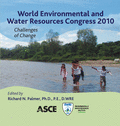Impact of Triclosan in Greywater on Antibiotic-Resistance in Soil Microbial Communities
Publication: World Environmental and Water Resources Congress 2010: Challenges of Change
Abstract
The use greywater (GW) for irrigation and other non-potable uses has been proposed as a method to conserve water resources. These uses would result in the direct discharge of this water to the environment with minimal treatment. The presence of antibacterial compounds in greywater raises concerns regarding potential impacts of these materials on the environment and human health. Our research examined the possible modification of microbial communities within the soil due to the presence of a commonly used antibacterial agent, triclosan. Along with community structure, we also looked at any selection for antibiotic resistance in bacteria associated with constant exposure to triclosan. We examined the impact of triclosan on soil microbial communities using soil filled columns irrigated with solutions of known composition. Two types of solutions (treatments) were examined greywater (synthetic) only and greywater with triclosan. The solutions were applied to the soil columns on a weekly basis. And the effluent was collected from each column and cultured onto plates to determine the number of heterotrophic bacteria present. Isolates were taken from the plates to determine antibiotic sensitivity. Finally, functional diversity was measured by assessing substrate utilization using BIOLOG EcoPlates. Our findings show that under constant exposure, the community structure did, in fact, change showing two very distinct heterotrophic populations between those that were treated with triclosan and those that were not. It was also seen that resistance to the four tested antibiotics (ampicillin, chloramphenicol, streptomycin and tetracycline) increased with higher numbers of resistant isolates associated with the columns receiving triclosan. Our results indicate that triclosan in greywater can have significant impacts on soil microbes. The change in microbial community structure could influence microbial soil processes such as nutrient cycling. Furthermore, while the antibacterial products may be present in very minute concentrations, their constant presence may be selecting for bacteria that are resistant to multiple types of antibiotics, thus making it harder to treat infections. Therefore, our results indicate that greywater should be treated to remove antibacterial agents before its use in lawn irrigation. Alternatively, the use of antibacterial containing products should be significantly reduced in the US.
Get full access to this chapter
View all available purchase options and get full access to this chapter.
Information & Authors
Information
Published In
Copyright
© 2010 American Society of Civil Engineers.
History
Published online: Apr 26, 2012
Authors
Metrics & Citations
Metrics
Citations
Download citation
If you have the appropriate software installed, you can download article citation data to the citation manager of your choice. Simply select your manager software from the list below and click Download.
